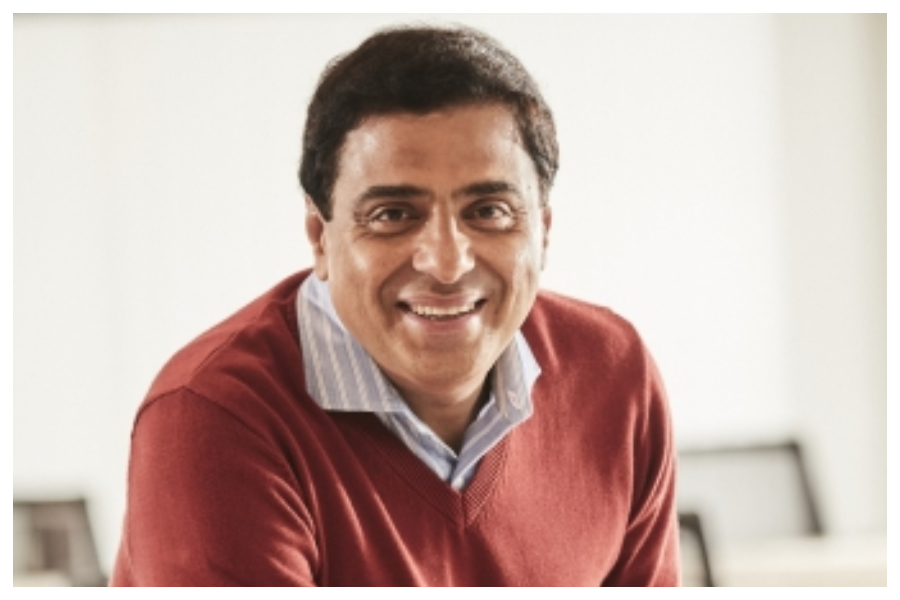Business
Ronnie Screwvala: No funding winter for startups with real business models

There is no funding winter for startups and unicorns with great and real business models and for those building organisations to outlast all others, according to Ronnie Screwvala, Co-Founder and Chairperson of higher education platform upGrad.
In an interaction with Screwvala said that even today, there are investments being closed daily across multiple sectors, as the world faces a great deal of uncertainty over multiple macro-economic factors.
Here are the excerpts from the interview:
Q: How do you look at the current wave of ‘funding winter’ in India?
A: I am always amused to hear this phrase ‘funding winter’, heard it so often in the last 15 years. I always thought only God was responsible for the multiple seasons we enjoy each year but of late, the private equity (PE) investor community is taking that place with their own patent on seasons.
Summer is when you bask in your own self-made glory, excesses and intoxication of hyper valuations, where no one is accountable and everyone is told to make hay while the sun shines.
Monsoon (unique to India) is a realisation that when ‘it rains it pours’ — good or bad.
Then, of course, is Winter, the time to re-write the same 50-page presentation that in summer months said exactly the opposite — the time to reverse the same intoxication of fund raise, valuations and hyper so-called growth with ‘one time’ write downs and blame the whole world, war, inflation and more, that was lurking around the whole summer but no one wanted to put their glasses on.
Seriously though, there is no funding winter for companies with great and real business models and for those building organisations to outlast all others. Even today there are investments being closed daily across multiple sectors — maybe not with the maverick investors who may be.
Let’s face it, the markets have corrected 10-12 per cent, that’s it. Overall, it is still way higher than pre-Covid and if you look, many companies are at their all-time high. This is also the best time for real businesses and mature founders not inflated with valuations to go out there.
Every company worth its value has to go through multiple seasons, over and over again, and the right ones grow and mature from that.
Also in Winter, the most elegant of snow leopards come out to hunt and be predators, and so Winter is the time for those who want to build to outlast and who want to be predators.
Q: The edtech sector is witnessing layoffs. Is this because funding dried up or there is more to it?
A: There is absolutely no ‘dry spell’. Just because a few handful of start-ups got crazily funded, made them lose all focus, pushed to grow and diversify are now being forced by those same investors to wake up and smell the coffee, does not mean there is any dry spell.
They were misguided by themselves and their Board and now are correcting themselves, unfortunately at the cost of valued working colleagues, but they are the exception, not the trend at all.
Never in a 100 years of education and ‘LifeLongLearning’ has there been a more opportune time to disrupt scale and include millions of college learners and working professionals to re-invent, re-skill and get onto a new growth path in their careers. India is also placed brilliantly to open up the higher education market in Asia and around the world.
We, at upGrad, have stayed away from the hubris of distraction and focused on outcomes and impacting careers.
Let there be no mistake, there is no better time than now. K12 went through its Covid bump and it is now seeing much needed correction, but the majority of companies in edtech are just getting started.
Q: How do you look at the global macroeconomic conditions that have engulfed economies the world over?
There were some interesting themes across the three days at the World Economic Forum (WEF) at Davos. Here are some takeaways:
A) Those who were questioning the end of globalisation had not really spent enough time defining what that meant in the first place, before sounding the death knell on it. Globalisation is here to stay as the world consumer wants it that way. An 18-year-old Zayda in Bangladesh wants to own an Apple iPhone and the 22-year-old Amari in Zambia wants to graduate from a UK university.
While the world leaders have in their own way created barriers, through war or threats of war and more insular growth, the seven billion+ people on this planet will not let that happen and globalisation will prevail.
B) There is a reskilling revolution that is happening and will be a tsunami over the next decade across the world. Better education and lifelong learning — accessible and affordable to all — digitally can and will add a massive $8 trillion to the global GDP in this decade. Power shifts in countries will take place based on the workforce and their population being ready for the jobs of tomorrow and also be the learning capitals of the world.
C) India also has the place and the position to be the new voice of global leadership — largest democracy, fastest growing economy and a world leader with clarity, conviction and an agenda to put it at the centre-stage in the world.
D) There is no doubt that the world is going to pass through a very, very challenging time. With food being disproportionately available to countries around the world, the poor will get poorer even if the rich do not get richer. Covid is not leaving the planet in a hurry but has got us all hyper alert on health enough to take notice of even Monkeypox – something that was prevalent in Africa for years but ever since it hit the “western” world.
And the war is not going away in a hurry and it will be interesting to see how engaged the West stays as the war prolongs or will they lose interest if it does not serve their agendas.
The big question we also need to track is how polarised the world will get in the next two-three years. All of this will call for incredible world leaders and leadership in politics and in building business and organisations.
Business
Indian stock markets open higher amid positive global cues

Mumbai, Dec 19: Indian stock markets opened on a positive note on Friday, taking cues from supportive global markets, even as benchmark indices remained on track to close the week in the red for the third consecutive session.
In early trade, the Sensex was trading at 84,866.06, up 384.25 points or 0.45 per cent at around 9:20 AM.
The Nifty index was also higher, quoting at 25,926.90, up 104 points or 0.4 per cent. The index continues to trade within the 25,700–25,900 range, reflecting trader indecision.
“Immediate resistance is placed at 25,900–26,000, while key supports are seen at 25,700 and 25,600,” analysts said.
Buying interest was seen in several heavyweight stocks. Shares of TMPV, Eternal, Infosys, Power Grid, BEL, Sun Pharma, and Bajaj Finserv gained up to 1.5 per cent and emerged as the top performers on the Sensex.
On the other hand, ICICI Bank and Bharti Airtel were the only stocks trading in the red during early deals.
Sectorally, all indices were trading higher. The Nifty Healthcare index led the gains, rising 1.14 per cent, followed closely by the Nifty Pharma index, which was up 1.1 per cent.
The Nifty Auto index also gained around 0.5 to 0.57 per cent.
The broader markets mirrored the positive sentiment, with the Nifty Midcap index gaining 0.45 per cent, while the Nifty Smallcap index was up 0.47 per cent.
Meanwhile, investors remain cautious ahead of several key global and domestic triggers.
Globally, market participants are keeping an eye on retail sales data from the UK, wage tracker data from the euro area, and the US Federal Reserve’s balance sheet numbers. On the domestic front, investors are awaiting the Reserve Bank of India’s Monetary Policy Committee meeting minutes and the latest foreign exchange reserve data.
In terms of institutional activity, foreign institutional investors turned net buyers, purchasing shares worth Rs 614.26 crore on Thursday.
Domestic institutional investors also supported the market, with net purchases of Rs 2,525.98 crore during the same session.
Business
India reaches 709 million active UPI QRs, logs 59.33 billion transactions in July-Sep

Mumbai, Dec 18: The unified payments interface (UPI) transaction volumes rose 33.5 per cent (year-on-year) to 59.33 billion transactions in the July-September period, as transaction value grew 21 per cent to Rs 74.84 lakh crore, a report showed on Thursday.
India reached 709 million active UPI QRs, marking a 21 per cent increase since July 2024. Dense QR acceptance across kiranas, pharmacies, transport hubs, and rural markets has made scan-and-pay the default payment mode nationwide, according to the report by Worldline India.
Person-to-merchant (P2M) transactions continued to outpace person-to-person (P2P), reflecting UPI’s dominance in everyday retail payments.
P2M transactions were up 35 per cent to 37.46 billion transactions while P2P transactions rose 29 per cent to 21.65 billion transactions, the report said.
The third quarter (Q3 2025) further reinforced India’s position as the world’s most dynamic real-time payments economy — where every scan, tap, and click is reshaping consumer and merchant behaviour.
The average ticket size declined to Rs 1,262 (from Rs 1,363), highlighting increased usage for micro-transactions such as mobility, food, healthcare essentials, and hyperlocal commerce.
Point of sale (PoS) terminals grew 35 per cent to 12.12 million (July 2024–July 2025). Bharat QR stood at 6.10 million, witnessing marginal decline amid the shift toward UPI QR dominance.
Private banks led acceptance deployment, accounting for 84 per cent market share. While credit card issuance grew by 8 per cent (on-year) to 113.39 million cards, debit cards reached 1.02 billion and prepaid cards stood at 470.1 million.
Credit card transactions grew 26 per cent to 1.45 billion, with transaction value at Rs 6.07 lakh crore. Debit card transactions declined 22 per cent, reflecting migration of low-ticket spends to UPI, the report showed.
Mobile and tap-based payments continued to accelerate, with contactless adoption gaining momentum across metros, mobility services, and quick-service retail.
“The outlook for Q4 2025 and early 2026 points to accelerated innovation and deeper ecosystem integration. Interoperable QR is expected to move from pilot phases to everyday usage across mobility, healthcare, fuel stations, and public utilities—delivering a unified scan-and-pay experience,” the report mentioned.
Business
Indian rupee likely to bounce back strongly in 2nd half of next fiscal: SBI report

New Delhi, Dec 17: Geopolitical uncertainties driven by the delay in the India-US trade deal have been the single-most important reasons for the rupee sliding against the US dollar, an SBI Research report said on Wednesday, adding that the rupee is likely to bounce back strongly in the second half of the next fiscal.
India’s trade data shows the remarkable resilience in navigating through prolonged uncertainty, more protectionism and labour supply shocks.
“While the geopolitical risk index has moderated since April 2025, the current average value of the index for April-October 2025 is much greater than its decadal average, which indicates how much pressure global uncertainties are exerting on INR,” State Bank of India’s (SBI) Group Chief Economic Advisor, Dr Soumya Kanti Ghosh, said.
Dr Ghosh further stated that consistent with their empirical analysis, “the rupee is currently in a depreciating regime and is likely to exit it”.
After breaching the psychologically important mark of 90 per US dollar, the rupee crossed the 91-level on Tuesday.
However, the rupee staged a sharp recovery on Wednesday, trading as strong as 90.25 during the day, as the cooling of crude prices also contributed to improved sentiment.
According to the SBI report, the data also indicates that the current fall is the quickest (in terms of number of days) of the rupee, scaled to 5 per USD. In less than a year, the rupee has slid from 85 to 90 per dollar.
The current slide appears to be primarily driven by FPI outflows, chiefly equities (after two years of robust inflows) and uncertainty regarding the US-India trade deal.
Since April 2, 2025, when the US announced sweeping tariff hikes across economies, the Indian rupee (INR) has depreciated by 5.7 per cent against USD (most amongst the major economies), notwithstanding sporadic phases of appreciation owing to optimism over the US-India trade deal.
“While INR is the most depreciated currency, it is not the most volatile. This clearly indicates that the 50 per cent tariff imposed on India is one of the major factors behind the current phase of rupee depreciation,” the SBI report noted.
-

 Crime3 years ago
Crime3 years agoClass 10 student jumps to death in Jaipur
-

 Maharashtra1 year ago
Maharashtra1 year agoMumbai Local Train Update: Central Railway’s New Timetable Comes Into Effect; Check Full List Of Revised Timings & Stations
-

 Maharashtra1 year ago
Maharashtra1 year agoMumbai To Go Toll-Free Tonight! Maharashtra Govt Announces Complete Toll Waiver For Light Motor Vehicles At All 5 Entry Points Of City
-

 Maharashtra1 year ago
Maharashtra1 year agoFalse photo of Imtiaz Jaleel’s rally, exposing the fooling conspiracy
-

 National News1 year ago
National News1 year agoMinistry of Railways rolls out Special Drive 4.0 with focus on digitisation, cleanliness, inclusiveness and grievance redressal
-

 Maharashtra1 year ago
Maharashtra1 year agoMaharashtra Elections 2024: Mumbai Metro & BEST Services Extended Till Midnight On Voting Day
-

 National News1 year ago
National News1 year agoJ&K: 4 Jawans Killed, 28 Injured After Bus Carrying BSF Personnel For Poll Duty Falls Into Gorge In Budgam; Terrifying Visuals Surface
-

 Crime1 year ago
Crime1 year agoBaba Siddique Murder: Mumbai Police Unable To Get Lawrence Bishnoi Custody Due To Home Ministry Order, Says Report












